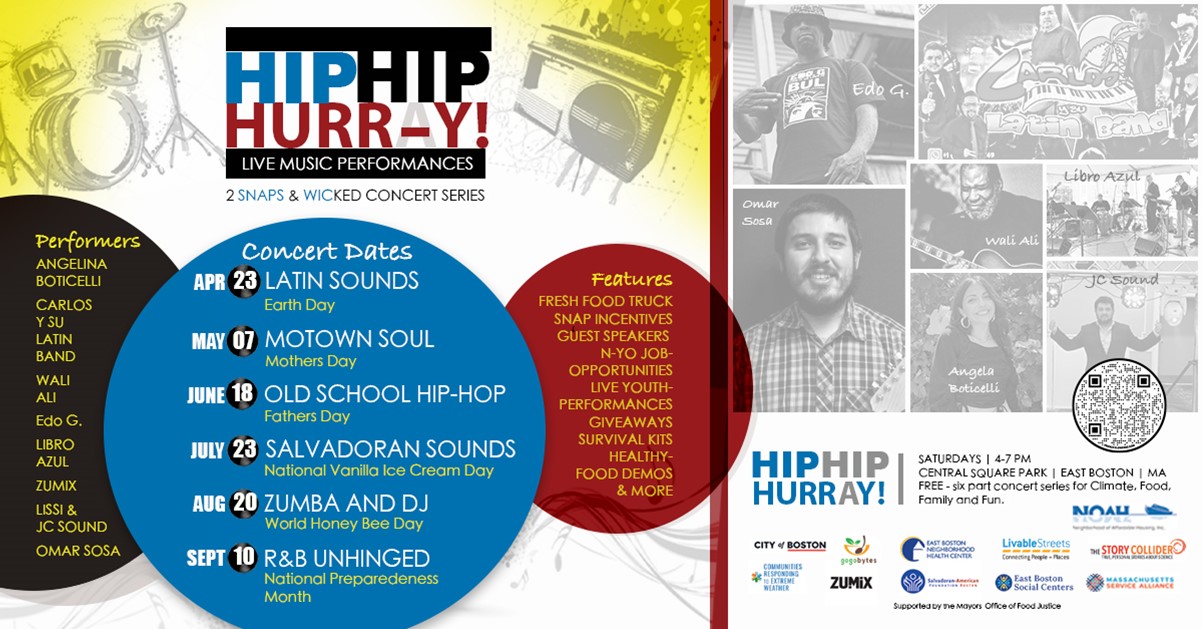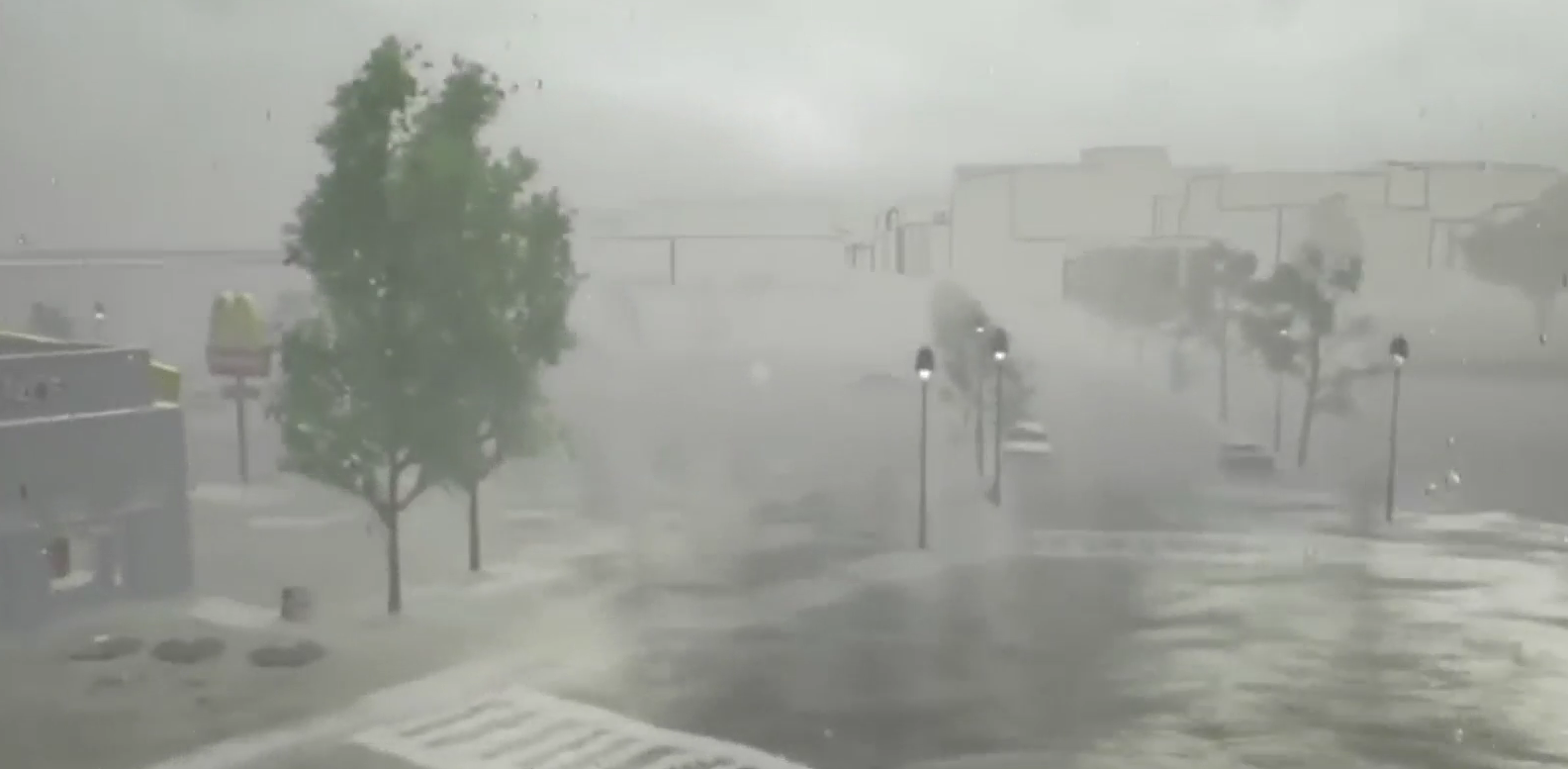
Why East Boston? Why Resilience?
Our newest climate effort is to build a robust East Boston Resilience Network. The primary objective is to address social and environmental justice with key stakeholders in order to help our vulnerable neighborhood build a multi-purpose Resiliency Network. Equity, transparency, resilience, sustainability, robust bilingual community engagement, and collaboration will be constant themes.
We will work with neighborhood groups to build a network which is able to respond to a variety of challenges, including climate change, energy efficiency, stifling food insecurity, worrisome public health matters (including COVID-19), and all-hazard/emergency preparedness measures. In particular, for East Boston, increasing sea-level rise/storm surge dangers are major threats to our community and an environmental justice concern of NOAH’s.
Individual and collective action is a big component of NOAH’s climate change resiliency plan. By identifying actions that people can take to reduce harm from potential climate change-related impacts, developing initiatives to make those actions easy and accessible, and educating residents of their risks and available solutions, we can create significant change - together.
Additional programs include:
Urban Tree Planting
NOAH youth organizers are helping plant and maintain more trees throughout the community of East Boston. With more trees we can reduce heat, provide shade, absorb excess rainwater, and absorb more carbon dioxide. To get a tree on your sidewalk or property, or to help us maintain current trees in East Boston, please contact Manlio Mendez at mmendez@noahcdc.org.
Adaptation Planning Working Group
Part of what makes our community great is the many different agencies and services concentrated in East Boston. However, this means all this infrastructure and services are at risk from climate impact events such as flooding, typically caused by storms and heavy precipitation. Many of these agencies are already engaged in resilience planning for their departments, to be sure they are ready for the current and future impact of climate change.
To be successful, resilience planning must be aligned and coordinated, ensuring each part of the community is covered. To facilitate this, NOAH has convened agency stakeholders and community representatives in an Adaptation Planning Working Group to coordinate actionable climate resilience plans that also represent the community’s interests and provide benefits to all.
History
Through the initial phase of Climate programming, NOAH convened key city and agency stakeholders to build a coalition to effectively support East Boston residents in their environmental change efforts. NOAH also implemented a ‘Supported Community Participatory Planning Model’ to educate and engage disadvantaged East Boston residents in the climate resilience conversation. Finally, NOAH was able to strengthen existing relationships and identify new partners to push for actionable plans.
In 2016, NOAH implemented a 3-year Grant Award from The Kresge Foundation to further its climate change resiliency efforts. This grant allowed NOAH to move forward with its three-part ClimateCARE program which includes strengthening community engagement; partnering with the City of Boston to advance its Climate Action Plan; and convening agency stakeholders in an Adaptation Planning Working Group which will facilitate coordinated, actionable climate resilience plans.
In 2019, NOAH and partner New York University began work on a Robert Wood Johnson Foundation project: Integrative Resilience for the SCALE UP East Boston: Social Cohesion, Adaptation, and Leadership in Emergencies in Urban Places. Final results from this work will be posted soon.
The Climate Resiliency Summit
2022:
The 2022 East Boston Resiliency Summit brought together more than 120 community residents and 22 organizational and academic leaders to discuss a variety of challenging issues related to resiliency in East Boston.
NOAH encourages an East Boston Resiliency Summit for residents, agencies, businesses and government because:
- ‘A climate resilient society is one that is: reflective (learns from experiences); robust (both people and infrastructure can withstand the impacts of extreme conditions); forward-thinking (with plans made to ensure systems function during extreme events); flexible (so systems and plans can change)
- Overall, climate resilience efforts improve the economic competitiveness of a city. This makes it more attractive for businesses and communities to settle there, increasing jobs, tax revenue, and services. In addition, it saves the local government money by reducing the damage from climate events. Planning also improves community resilience to climate change by reducing their vulnerability. This refers to improvements in their ability to “bounce back” after a climate event and “bounce forward” by preparing for a climate event. Therefore, climate resilience planning is not only beneficial for cities, communities, and businesses socially but also economically.’ (Rebecca Clarke/Elizabeth MacLennan, January 13, 2022)
East Boston is an Environmental Justice (EJ) community. By definition, we are vulnerable physically, socially and economically. A storm surge coupled with sea-level rise could severely disrupt our lives and cause billions in damages. Central Sq is most vulnerable and could be cut off if a ‘Superstorm Sandy’ were to hit anytime soon. We need remedies and soon! It takes years to agree upon, plan, permit, budget and build these preventive measures. This Resiliency Summit will begin to explore a variety of additional challenging issues which affect resiliency such as Dealing with Extreme heat, Flood prevention and Critical infrastructure, Evacuation preparations, Air Quality & Food insecurity, Pandemic planning, Housing issues, Youth concerns - all underlined with Equity considerations. To be most resilient, we actually need a collaborative Resiliency Network to alert and involve our vulnerable community to the dangers.
If we are willing to collaborate and work with each other, as well as First Responders to help us plan for a Climate event, East Boston’s thriving and diverse community will be better off in the long run.
2020:
In November 2020, NOAH held a Virtual Resiliency Assembly to put a spotlight on best local change agents, including our youth leaders, and to open a dialogue on the need for an East Boston Resiliency network to amplify our community efforts.
The Hip Concert Series 2022
FREE | CENTRAL SQ. PARK | SATs | 4-7 PM
The HIP HIP HURRAY! 2 SNAPS and WICked FUN CONCERT SERIES (HIP Concert Series) was a brand-new six-part initiative held over the summer of 2022. It was designed to respond to a spike in food insecurity by destigmatizing and encouraging the use of federal food programs: SNAP, HIP and WIC. Click here for more information.
SCALE UP East Boston: Social Cohesion, Adaptation, and Leadership in Emergencies in Urban Populations
The major goal of SCALE UP is to enhance resilience for climate and other emergencies by building social cohesion and fostering systems-thinking among a diverse group of racial, cultural, and linguistic residents and community leaders in East Boston. To better understand whether improved social cohesion can help make vulnerable communities more resilient to climate risk, the SCALE-UP initiative designed four activities to assess and cultivate leadership and organizational resilience:
(1) a residential survey
(2) an organizational network mapping initiative
(3) a planning assembly
(4) leadership development.
The SCALE-UP project was co-developed with youth in East Boston (N-YO). The immediate focus was to create resilience for acute and chronic effects of climate change, especially flooding due to hurricanes and sea level rise. The NOAH Youth have developed an understanding of climate science and stresses particular to East Boston and are exploring the ways in which the community can become resilient.
SCALE UP acts as the initial phase in the launch of our ‘Whole Community’ East Boston Resilience Network (EBRN). Through SCALE UP, NOAH has collected community-level and organizational data in East Boston, initiated the early development of a Climate Resilience Conceptual Framework, and served as the foundation for the creation of the East Boston Resilience Network.
In addition, NOAH has held three major annual East Boston Climate Assemblies related to this work.
NOAH's Climate Change Resiliency News and Updates
Community Clean Air Grant Recipient Announced
The City of Boston has announced the recipient of the Community Clean Air Grant program to support community-based projects to address air pollution. This grant program is a part of Boston’s equitable and sustainable recovery from the COVID-19 pandemic. The funding gives Boston residents and organizations the resources and tools to carry out community-driven projects that reduce emissions and bring short-term benefits to our neighborhoods.
Click here for more details.
Watch: New Simulations Help Illustrate Threat of Flooding in Boston – NBC Boston
Connect with us on social media at:
Twitter: @NOAHCDC, @EastBostonGAL, @EBEnvironmental


